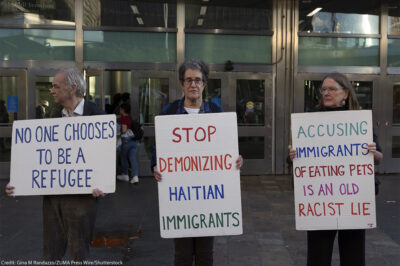We’re Suing the Government for Its Detention and Abuse of Rosa Maria, a 10-Year-Old Child With Cerebral Palsy


At this very moment, the Office of Refugee Resettlement is detaining Rosa Maria Hernandez, a 10-year-old girl with cerebral palsy who recently underwent gallbladder surgery, and is refusing to release her into the care of her family, despite her doctor’s advice. How exactly did this child become the Trump administration’s target for deportation? It’s an egregious case of government overreach, and now the subject of an American Civil Liberties Union lawsuit.
On Oct. 24, 2017, Rosa Maria was traveling to Driscoll Children’s Hospital, which is 150 miles from Laredo, Texas, where she lives with her parents and siblings. She was accompanied by her 34-year old cousin, Aurora Cantu, who is a U.S. citizen. Around 2 a.m., Customs and Border Protection stopped her medical transport vehicle at a checkpoint in Freer, Texas. Border Patrol agents approached the vehicle and asked to see everyone’s “papers.” After she and the driver provided their identification, Aurora explained that they were on their way to a hospital and that Rosa Maria needed an operation. She showed the agents medical documentation and explained that at 10 years old, Rosa Maria did not carry ID.
Nonetheless, the vehicle was forced to pull over. After a half an hour or so, the Border Patrol agents said that Aurora and Rosa Maria could continue onto the hospital, but that they were going to follow them and once the surgery was over, “the girl” would be “processed” for deportation.
True to their word, they trailed the vehicle for the remaining 80 miles to Corpus Christi. Once at the hospital, armed male agents followed Rosa Maria’s every move, including staying in the room while nurses checked her weight and vital signs. They stood outside the open door while Rosa Maria waited to be taken into the operating room. After she woke up, technically discharged by the hospital but still resting in her bed, .
Customs and Border Protection then transferred Rosa Maria into the custody of the Office of Refugee Resettlement (ORR) as an “unaccompanied child.” ORR has detained her in a facility in San Antonio, more than 150 miles away from her family members. ORR is refusing to release Rosa Maria despite public outcry and serious concerns that the facility is unequipped to address her medical and psychological needs.
Call the Office of Refugee Resettlement
By arresting Rosa Maria and refusing to reunite her with her family, CBP and ORR are not just inflicting cruel and unnecessary trauma on a child -- they are breaking laws on multiple fronts and violating the Constitution.
Strike 1: Border Patrol had no authority to put Rosa Maria into the custody of the Office of Refugee Resettlement, which has no authority to detain her.
The allows CBP to transfer “unaccompanied children” into the custody of the Office of Refugee Resettlement, which in turn, derives the authority to detain “unaccompanied children” from the .
The law defines “unaccompanied” children as children who don’t have a parent or guardian available to care for them in the United States. But Rosa Maria has never been “unaccompanied.” Rosa Maria has always lived in the care and custody of her parents, who are devoted to her well-being. Her cousin Aurora was by her side and her parents were in Laredo, awaiting their daughter’s return, when the arrest was made. The federal government is not authorized to knowingly and forcibly separate parents from a child when they are available to provide that child with care and physical custody.
Strike 2: Border Patrol made an illegal, warrantless arrest.
Under , CBP can make warrantless arrests only where there is probable cause of removability and the person is “likely to escape before a warrant can be obtained for [her] arrest.” Again, Rosa Maria is a child with a serious disability who was recovering from surgery at the time of her arrest. There was never any risk that she would “escape” before a warrant could be obtained.
Strike 3: Border Patrol’s action discriminate based on disability.
prohibits discrimination against any “qualified individual with a disability” by any program or activity conducted by any executive branch agency, which includes both CBP and ORR. Rosa Maria has cerebral palsy, which is a disability under the Rehabilitation Act. By arresting her, failing to make necessary medical accommodations, and depriving her of contact with her family, despite her doctor’s instructions that it was in her best interest to be in the custody of relatives, CBP acted with deliberate indifference to Rosa Maria’s disability. She has suffered and continues to suffer physical injury and emotional distress because of their actions.
Strike 4: ORR is violating federal protections for minors.
ORR’s detention of Rosa Maria violates the terms of a 1997 consent decree, known as the Flores decree, which remains in effect to this day. The decree established several procedural protections for children to prevent arbitrary detention, one of which requires that minors are placed in the “least restrictive setting appropriate to the minor’s age and special needs…” A further stipulation requires that the government release a minor to the child’s parent unless “the detention of the minor is…required either to secure his or her timely appearance” before the immigration agency or the immigration court, or “to ensure the minor’s safety or that of others.”
Strike 5: Rosa Maria and her family have due process rights and ORR is violating them.
Rosa Maria’s ongoing detention violates both her and her parents’ due process rights to family integrity under the Fifth Amendment. This case “perhaps the oldest of the fundamental liberty interests recognized by” the Supreme Court—“the interest of parents in the care, custody, and control of their children.”
The Supreme Court has that due process entitles a parent to “a hearing on [her] fitness as a parent before [her] children [are] taken from [her].” Rosa Maria has been in the care and custody of her parents since birth — a fact known to the government before it arrested her and placed her in ORR custody. CBP and ORR have never even suggested that her parents are unfit to care for Rosa Maria; much less provided a hearing to determine their fitness prior to her arrest and detention. Nonetheless, ORR has now put the onus on Rosa Maria’s parents to show that they are adequate custodians for their daughter. But this is precisely backwards; the onus must be on the government to justify its decision to take the child from her parents’ care.
The Due Process Clause permits civil detention of individuals only where it is reasonably related to the government’s interests in preventing flight risk or protecting the community from danger. Rosa Maria is neither a flight risk nor a danger. She is a 10-year old child with serious medical needs.
To add insult to Constitutional injury, CBP has asserted that its agents were required to arrest Rosa Maria for deportation. Dan Hetlage, a spokesman for Customs and Border Protection, , “We don't have the discretion. It's not a traffic ticket. We follow the letter of the law." That is a . While President Trump has the definition of who is considered an immigration enforcement “priority” under his administration, immigration agents retain the ability to exercise “” when human decency calls for it.
CBP has also made the Orwellian claim that its actions were done for the “welfare of the child.” Rosa Maria has been taken from the only home that she’s ever known. Because of her cerebral palsy, she requires constant, specialized care, which her family is in the best position to provide. Even without a disability, most 10-year-olds would struggle to comprehend or process how they went to sleep at a hospital and woke up in the custody of the U.S. government. Rosa Maria has her mother over the phone, “Mom, where are you?”
Every single day that she remains separated from her family, the nightmare continues.





